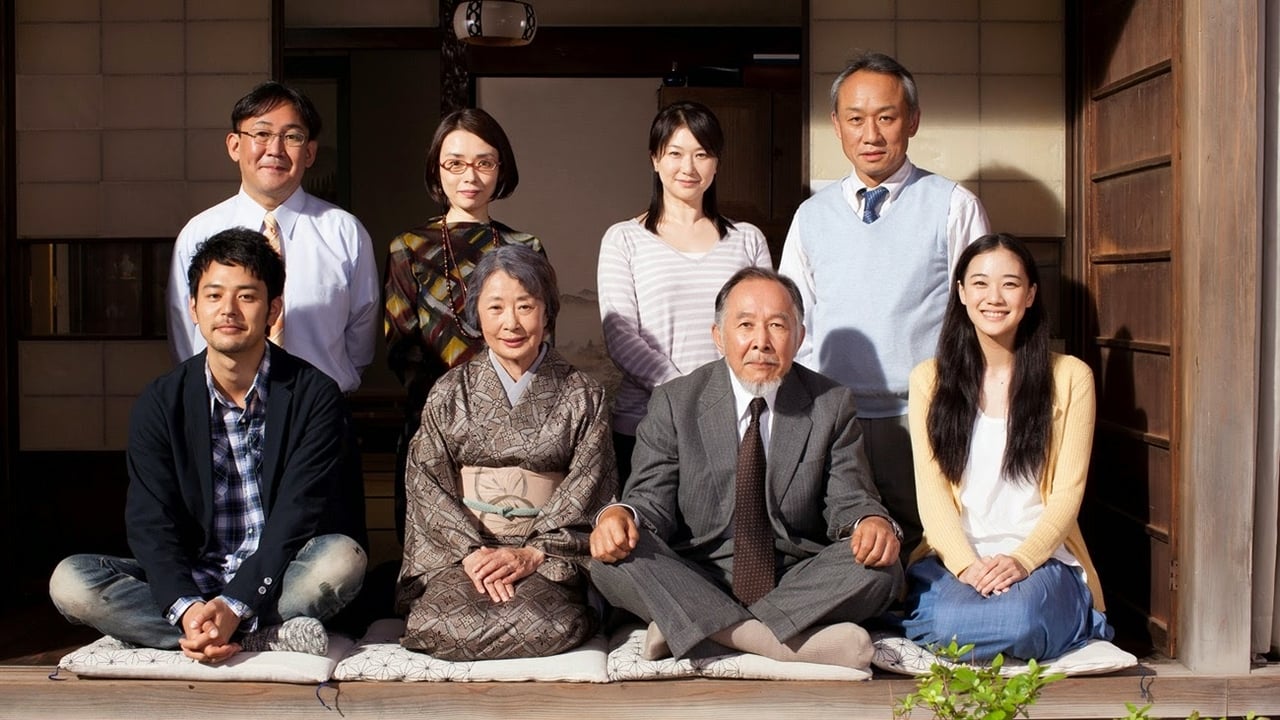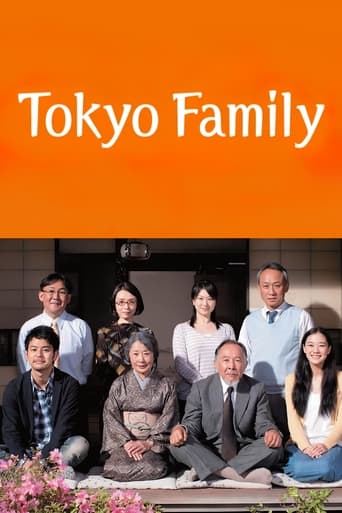BlazeLime
Strong and Moving!
FirstWitch
A movie that not only functions as a solid scarefest but a razor-sharp satire.
Ella-May O'Brien
Each character in this movie — down to the smallest one — is an individual rather than a type, prone to spontaneous changes of mood and sometimes amusing outbursts of pettiness or ill humor.
Guillelmina
The film's masterful storytelling did its job. The message was clear. No need to overdo.
user-15-840154
This is a very touching movie, but after saw a film critic, I found that for Westerners, the film may not have that deep feeling. So as an Asians, I would like to say this film is quite moving for Asians.Perhaps the emotional expression of Eastern and Western cultures are quite different. Asians express their emotions in a more delicate way. Therefore, in the film, the delicate movements and expressions are very emotional expression to the Asians audience. ''In addition, filial piety, and the gap between urban and rural life, as well as homesickness, are very important issue for the Asians.The most touching of this film is the love of parents to their children, although there is no direct face to face expression, but through the mother and father's behavior, they show indeed deep love.So I would like to say to Western audiences that this is a very good movie that expresses the emotions of Asians. If you can really appreciate the moving part of this film, you can understand the Asians's emotion world.Not to mention, the soundtrack of Hisaishi is really great!
Andres Salama
A remake of Yasujiro Ozu's Tokyo Story (1953), which is widely regarded as one of the finest films ever made. Director Yoji Yamada follows the plot of the earlier film closely (though he doesn't borrow Ozu's stylistic touches; thus, this is necessarily a more conventional movie).There are also changes in some of the characters. The youngest children, Kyoko and Keizo, do not exist in this version. Noriko here is not the widowed wife of their fallen son in the war, but the girlfriend of their son Shoji (who is alive here, and works as a theater decorator). Noriko is played by Yu Aoi, who is pretty and charming, though she lacks the screen charisma Setsuko Hara has in the original version (she is given less screen time, also). Also, I notice that in this version the elder children and the grandchildren are less rude to the elder couple. For instance, the eldest daughter Shige, as played as Tomoko Nakajima, is not as mean and bitchy as Haruko Sugimura was in the original. And the grandfather Shukichi, is less nice here than in the original version. He openly questions his children, especially Shoji, which in the original only did obliquely.Obviously, this film is not up to the level of the original, but it is a well made, pleasant movie to watch.
d-JCB
9/10watched an amazing film this morning… just when i was trying to get to sleep after another "up till sunrise" night… it's called Tokyo Family by Yôji Yamada, a tribute to legendary Japanese director Yasujirô Ozu and his most famous film, Tokyo Story from 1953… it's quite similar in idea, where older parents from a country sea side town come to Tokyo to visit their kids / grand kids, but no one really has time for them… Tokyo has this high paced way of living, while in the country the old folks just kick back and enjoy life go by… the relationship between the father and son reminded me of my situation with dad who recently passed away - my personality & outlook in life is like mine while the fathers is like my dad… also there's a death in the film where the whole family has to go thru, very sudden like dad's circumstances… it destroyed me, but in a good way cause it allowed be to grieve a bit more, cause I've been resisting it a bit since dad's funeral… it really is a heart breaking film, and like death it is hard for all family members to endure… in the film the funeral & wake were very beautiful, respectful… all the family got together like we all did… it finishes on a positive note that life must go on, the father becomes more accepting of the son & vice versa… thru this death in the family they break their stand off between each other and bond in their own unique way…instant 9/10 & keen to watch it again… u should too, to see the contrasts between generations, traditions & cities… old times compared to modern times… something that will be timeless, just like Yamada modernising the Ozu 50s masterpiece with another masterpiece that will be also treasured for generations to come
Ed Uyeshima
Updating a classic as revered as Yasujiro Ozu's "Tokyo Story" is no small feat, and it is left to former Ozu protégé Yôji Yamaha along with co-screenwriter Emiko Hiramatsu to contemporize a film that managed the magical feat of being timeless and of its time (post-WWII Japan). Yamaha was 82 when he directed this overlong 2013 drama, and there is a sense of gravitas to his approach which could be seen as a respectful tribute to his mentor. However, what's missing is the deep sense of melancholy of the original, the delicate emotionalism which was well matched by empathetic performances from Ozu's regular players, chief among them the legendary Setsuko Hara's beautifully modulated turn as Noriko. This character has been relegated to a smaller role here, and this is just the beginning of the problems with the new film made exactly sixty years after the original.The plot follows the same basic framework. Retired teacher Shukichi Hirayama his wife, Tomiko live on a small island near Hiroshima. They come visit their grown children in Tokyo for a few days. There were five children in the original film, the youngest a schoolteacher who lived with them. This time there are three, probably a more accurate demographic for current-day Japan, but like the first story, the elderly couple is shuttled around rather mercilessly by their children who are leading their own hectic lives. They first visit with elder son Koiichi, a local doctor, his wife and two kids. Then there is the snippy daughter Shigeko who has a buffoonish husband and runs a hair salon. Last is youngest son Shoji, a freelance set designer who barely scrapes by but doesn't seem to mind. Noriko is no longer a widow central to the story on her own but rather Shoji's hidden girlfriend, the one who eventually provides the bridge to his largely estranged parents.As anyone familiar with "Tokyo Story" will know, tragedy strikes, and the surviving family comes to terms with what remains of their elusive bonds with one another. Zeroing in on three children would lead one to believe deeper characterizations would follow, but Yamaha and Hiramatsu seem so intent in evoking the original story, the opportunities are lost. Even passing mentions of the Fukushima earthquake and the country's pallid economic state do little to make the story feel more vibrant and relevant. The cast is proficient but variable when it comes to lasting impact. As Shukichi, Isao Hashizume plays the role in a more standard curmudgeonly fashion than Ozu regular Chishū Ryū, but Kazuko Yoshiyuki hits the right notes as Tomoko. Masahiko Nishimura plays Koichi even more stoically than Sô Yamamura did as the role remains elliptical at best.In the comparatively showy role of Shigeko, Tomoko Nakajima stands clearly in the shadow of the memorable Haruko Sugimura who could show respect, pettiness and conniving in a realistically mercurial fashion. However, former teen heartthrob Satoshi Tsumabuki manages to convey a palpable figure out of the puppyish Shoji who loves his mother but remains shaped by his father's disappointment. Yu Aoi has the unenviable task of stepping into Hara's shoes, though her sympathetic likability gets her through her key final scene with Shukichi with surprising poignancy. It would have been unimaginable to conceive of an update that could approach the resonance of the original, and somehow Yamaha proves that point with his overly deliberate pacing. Still, certain scenes like the heartfelt bedside chat between Tomoko and Shoji, well played by Yoshiyuki and Tsumabuki, make this worthwhile for a once-through.

